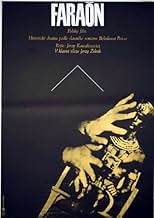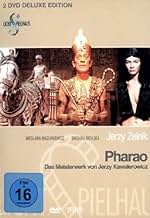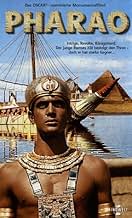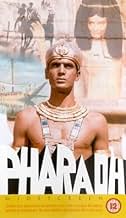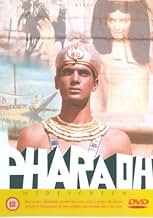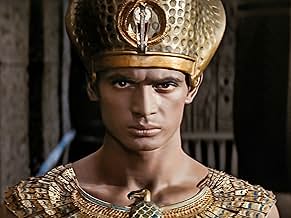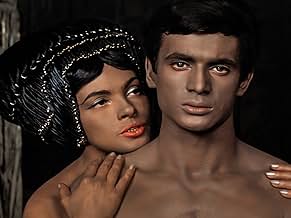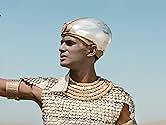AVALIAÇÃO DA IMDb
7,3/10
2,5 mil
SUA AVALIAÇÃO
O jovem Faraó Ramsés XIII entra em confronto com o clero do Egito por causa da influência nos assuntos do estado e seus cofres.O jovem Faraó Ramsés XIII entra em confronto com o clero do Egito por causa da influência nos assuntos do estado e seus cofres.O jovem Faraó Ramsés XIII entra em confronto com o clero do Egito por causa da influência nos assuntos do estado e seus cofres.
- Direção
- Roteiristas
- Artistas
- Indicado a 1 Oscar
- 1 vitória e 2 indicações no total
Barbara Brylska
- Kama - Priestess of Astharte
- (as Barbara Bryl)
Emir Buczacki
- Tutmosis - Ramses XIII's Friend
- (as Jerzy Buczacki)
Jerzy Block
- Fellah opening the channel
- (as Jerzy Blok)
- Direção
- Roteiristas
- Elenco e equipe completos
- Produção, bilheteria e muito mais no IMDbPro
Avaliações em destaque
The first time I have seen the movie Pharaon directed by Kawalerovicz I was just a teenager. The movie have punched me like only a few things during my teenage years (some other movies,rock'n'roll songs,girls...). I really didn't remember why I was so fascinated with the movie but I have memory that movie have "something". Therefore it was the movie I have always wanted to see again. Some 30 years later finally I have a chance to see it again. Restored version. Still impressive after all this years. Excellent camera. True colours. Ancient Egypt as I have always imagined. Fine balanced rythm. Easy moving plot, enough mysterious to keep our attention. Everlasting story. Pure masterpiece, giving everyone different experience. Message? Like every piece of art, 1000 people will see it from 1000 different points of view. One have to keep in mind that movie have been made by polish filmmaker in the middle 60's, not necessary oponent of the polish establishment at the time, author who maybe have a certain standpoint to non-secular
matters. Specially keeping in mind his previous movie Joanne mother of angels. The movie is simply nice. Must see.
an important Polish novel. a special film, precise adaptation of the first. and atmosphere of an old empire. short - a kind of parable about power, illusion and generous plans. after decades, its basic force source is the delicacy of details and performances. the slow images, the links between politic and religion, economy and need of change, the supremacy of a group against the king will , the fragility of a young leader and the fall of each great state. the music, the images and the hard work to create a remarkable film. the emotions and the spirit of lost world. more than adaptation of Prus masterpiece, it is reflection of profound roots of each period. and that fact does it not only a form of history lesson but a seed for reflection about present.
Polish director Jerzy Kawalerowicz's long gestated film adaptation of Bolesław Prus' historical novel PHARAOH is an ambitious endeavor, dazzles in its epic scale and formalist gravitas with an exclusive Polish cast, which leads to one prescribed proviso: for purists, it is beggar belief to watch a movie about ancient Egyptians where everyone sports Polish through and through; but other than that, the film is a marvel orchestrated with vigor, mettle and pathos.
The story centers around the story of an apocryphal pharaoh Ramses XIII (a 20-year-old Zelnik graced with haughty handsomeness and solemness), whose hellbent effort to seize power and pecuniary autonomy over an ever-increasingly theocratic clutches of the clergy in the Ancient Egypt.
The movie opens with a static close-up of two scarabs, competing for their trophy, then reveals a throng of Egyptian soldiers marching in an expansive desert, and directly points out the strife between the young Ramses XIII and the High Priest Herhor (Pawlowski), in order to show reverence to the sacred scarabs, Herhor commands the troops to take a devious route which causes damage to the newly-built water channels, and a resultant suicide of the channel digger. The incident enrages Ramses XIII, and he vows to take down the clergy when he assumes the regalia.
That day would not be too long in waiting, but what also awaits him is an Egypt sapping in wealth and sway, the priests arrange unfavorable treaties with the neighboring Assyrians in order to keep warfare at bay, which ostensibly seems like a well-intentioned strategy to save the hoi polloi from the scourge of war, but the truth is, there is large amount of gold and other fortunes being squirreled away in the labyrinth of the priests' temple, nominally can be only appropriated when in exigency, which the High Priests would never grant in favor of feathering their own nests. This is the touch paper which Ramses XIII deploys to foment the masses against the clergy, in an attempt to take the latter down once for all. Sadly he is still wet in his ears, and the priests are not ready to back down without a fight.
As a historical saga, PHARAOH is unusually lean on action pieces and subdued in its chromatic approach, one could imagine if the story were to be transposed as a Hollywood tent-pole in a post- BEN-HUR (1959) era, all the glittering and grandiose would suffuse its majestic set, and battleground bedlam pumped up by polished fighting competence. Here, in a much less ostentatious and more internalized style (costumes are astonishingly designed in its originally exotic verisimilitude), what comes about is a tragic tale of one young man's over-confidence in his prowess against something far more sinister, deceptive and ruthless than he has ever imagined, with a sideswipe to the benighted mob, when an eclipse crops up, all hell broke loose and burrowing a hole in the ground is their knee-jerking reaction.
Performance-wise, the cast rounds out a mostly po-faced dourness even for those who are laughing in the end (with Pawlowski emanating the highest voltage), sometimes emotes a ghost of urgency but none-too ravishing to be brutally frank. Yet, it is Kawalerowicz's arduous effort to minutely visualize a mythical epoch when primitivity and obtuseness overlay the world, yet through a tall-tale where a spate of human frailties abound and speak volumes of what one can assimilate into today's circumstances, it galvanizes new audience with its ritualistic posture and beguiling aesthetic attributes.
The story centers around the story of an apocryphal pharaoh Ramses XIII (a 20-year-old Zelnik graced with haughty handsomeness and solemness), whose hellbent effort to seize power and pecuniary autonomy over an ever-increasingly theocratic clutches of the clergy in the Ancient Egypt.
The movie opens with a static close-up of two scarabs, competing for their trophy, then reveals a throng of Egyptian soldiers marching in an expansive desert, and directly points out the strife between the young Ramses XIII and the High Priest Herhor (Pawlowski), in order to show reverence to the sacred scarabs, Herhor commands the troops to take a devious route which causes damage to the newly-built water channels, and a resultant suicide of the channel digger. The incident enrages Ramses XIII, and he vows to take down the clergy when he assumes the regalia.
That day would not be too long in waiting, but what also awaits him is an Egypt sapping in wealth and sway, the priests arrange unfavorable treaties with the neighboring Assyrians in order to keep warfare at bay, which ostensibly seems like a well-intentioned strategy to save the hoi polloi from the scourge of war, but the truth is, there is large amount of gold and other fortunes being squirreled away in the labyrinth of the priests' temple, nominally can be only appropriated when in exigency, which the High Priests would never grant in favor of feathering their own nests. This is the touch paper which Ramses XIII deploys to foment the masses against the clergy, in an attempt to take the latter down once for all. Sadly he is still wet in his ears, and the priests are not ready to back down without a fight.
As a historical saga, PHARAOH is unusually lean on action pieces and subdued in its chromatic approach, one could imagine if the story were to be transposed as a Hollywood tent-pole in a post- BEN-HUR (1959) era, all the glittering and grandiose would suffuse its majestic set, and battleground bedlam pumped up by polished fighting competence. Here, in a much less ostentatious and more internalized style (costumes are astonishingly designed in its originally exotic verisimilitude), what comes about is a tragic tale of one young man's over-confidence in his prowess against something far more sinister, deceptive and ruthless than he has ever imagined, with a sideswipe to the benighted mob, when an eclipse crops up, all hell broke loose and burrowing a hole in the ground is their knee-jerking reaction.
Performance-wise, the cast rounds out a mostly po-faced dourness even for those who are laughing in the end (with Pawlowski emanating the highest voltage), sometimes emotes a ghost of urgency but none-too ravishing to be brutally frank. Yet, it is Kawalerowicz's arduous effort to minutely visualize a mythical epoch when primitivity and obtuseness overlay the world, yet through a tall-tale where a spate of human frailties abound and speak volumes of what one can assimilate into today's circumstances, it galvanizes new audience with its ritualistic posture and beguiling aesthetic attributes.
Interesting movie. Beautiful costumes and sites. The costumes look very much original. Should be longer: 6 to 12 hours. Worth having it in your own DVD library, if you like history movies. This particular edition has only English dubbed version; I wish that it had the original Polish version as well.
This film is a lovingly rendered meditation on the dissolution of an ancient dynasty. The slow and stately pace matches centuries of the oppressive weight of ossified tradition bearing down on a dying culture, symbolized by the dead stone colossi and gargantuan architecture. There are moments of great beauty realized in its passing, such as the lovely sequence of fowling from a punt in the marshes, and the opening scene of divination on the battlefield by means of observing the movements of the sacred scarab dung beetles. Without a doubt, the most convincing depiction of those fascinating past people to date on the screen
Você sabia?
- CuriosidadesPharaoh Ramses XIII is a fictional character. While the name Ramses/Ramesses was relatively common for Pharaohs of the 19th and and 20th Dynasties, there were only 11 historical Pharaohs of that name. Two of them were members of the 19th dynasty, and nine of them were members of the 20th dynasty.
- ConexõesReferenced in Natchnij mnie wiara (1994)
Principais escolhas
Faça login para avaliar e ver a lista de recomendações personalizadas
- How long is Pharaoh?Fornecido pela Alexa
Detalhes
- Tempo de duração2 horas 31 minutos
- Cor
- Mixagem de som
- Proporção
- 2.35 : 1
Contribua para esta página
Sugerir uma alteração ou adicionar conteúdo ausente


